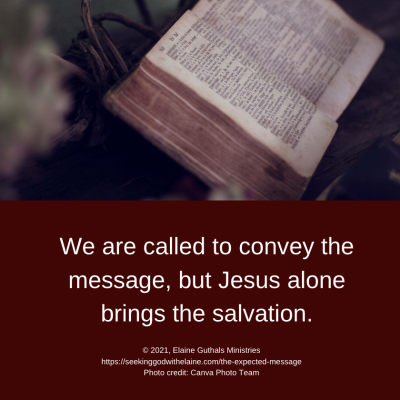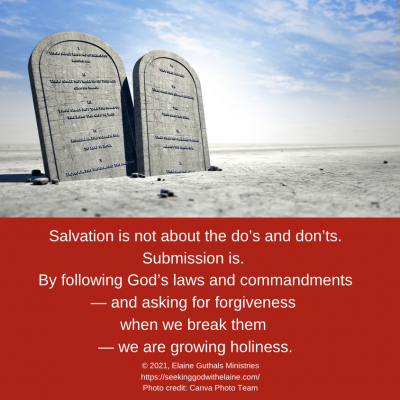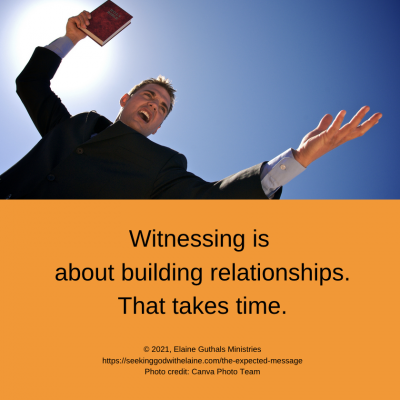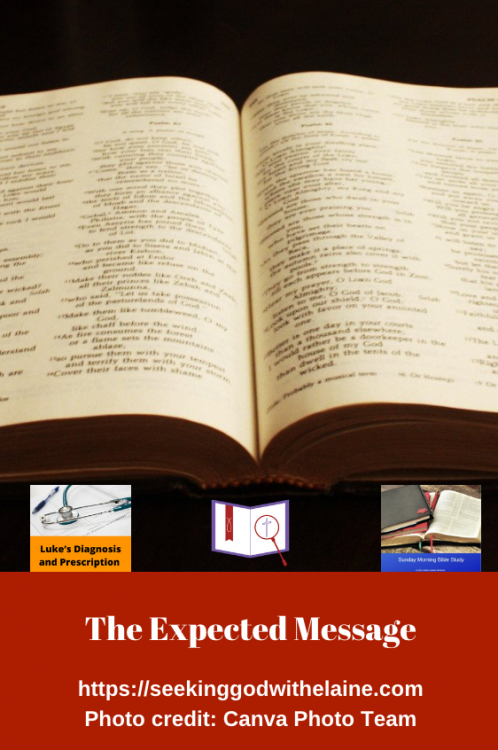Jesus may have unexpectedly visited His disciples, but the message He was telling was the same one He had always told. This daily devotional looks at the message and Jesus’ plan to have it broadcast.
Nuggets
Jesus’ mission centered on the condition of souls.
The starting place for spreading the message was Jerusalem, and it was up to the disciples to do it.
God will equip us to do His work.

In the last devotion, we talked about how Jesus unexpected showed up while the disciples were hiding in a room somewhere. They did not expect to see the Risen Savior.
The message Jesus told them was the message He had been telling them all along. “Now after John was arrested, Jesus came into Galilee, proclaiming the gospel of God, and saying, ‘The time is fulfilled, and the kingdom of God is at hand; repent and believe in the gospel’” (Mk. 1: 14-15 ESV).
Let’s take a look at the message Jesus told the disciples that night.
Let's Put It into Context
“He also said to them, ‘This is what is written: The Messiah will suffer and rise from the dead the third day’” (Lk. 24: 46 CSB)
Here are the nuggets from the last devotion.
- Jesus unexpectedly appeared to the disciples and both encouraged and chided them while proving He was real.
- Prophecy always indicated that the Messiah would suffer and die, though the disciples didn’t expect and understand the words.
The Expected Message of Repentance
“and repentance for forgiveness of sins will be proclaimed in his name to all the nations …” (Lk. 24: 47 CSB)
Jesus’ mission centered on the condition of souls.
Jesus was all about repentance, forgiveness, and sin. Let’s look at the last first before moving on to the other two.
Sins are actions by humans that disobey God and break one of His reasonable, holy, and righteous laws and commandments, goes against a purpose He has for us, or follows Satan’s promptings.
Glossary
God always knew that mankind was going to disobey Him and let sin into the world. With sin, death, crucifixion, and resurrection all in place, He created us anyway.
The world God created was permanent. It was a paradise that had no illness and death, no anger and hate.
God gave man just one restriction. “… You may freely eat of every tree of the garden; but of the tree of the knowledge of good and evil you shall not eat, for in the day that you eat of it you shall die” (Gen. 2: 16-17).
Satan convinced Eve to not believe and to disobey what God said. Satan said bite; Eve bit; and Adam bit, committing the original sin.
To read a related devotion, click the button below.
Adam and Eve’s sin unleashed consequences for that act. The consequences of sin are spiritual death and separation from God. The results of sin are poverty, crime, disease, and death — just to name a few.
Our relationship with Him was broken, however, because we were no longer upright. “For the LORD is righteous, he loves justice; the upright will see his face” (Ps. 11: 7 NIV). God does not tolerate sin.
When the relationship broke, that meant we no longer had access to the Sovereign God. So, God had to come up with a way to fix our relationships. He designed the Plan of Salvation with Jesus as the Sacrifice.
Redemption is where something is used in exchange for something else to gain or regain something. Jesus is our Redeemer because He
- was born of a virgin, making Him 100% God and 100% man;
- gave His life on the cross for us so that His blood could pay the price for our sins; and
- because of God’s great might and power, rose from the grave, conquering death and paying the price for our sins.
Jesus paid the price for our sins but that doesn’t mean we don’t have to do our parts. We have to repent and believe.
Repentance is acknowledging our separation from God and expressing sorrow for breaking God’s laws and commandments by making the commitment to changing ourselves through obedience so that we no longer do the wrong things. Lynch wrote, “Repentance is a change of mind leading to a change of conduct.”
Resource
The Plan of Salvation was accomplished through His grace. Grace is a free and unmerited gift from the Heavenly Father given through His Son, Jesus Christ, that enables salvation for and spiritual healing of believers by the work of the Holy Spirit.
We access this grace through faith. Faith is the conviction that the doctrines revealed in God’s Word are true, even if we do not understand all aspects of them, a belief which impacts our lives.
Because we have faith and believe, we gain the forgiveness of our sins. Forgiveness is, when we ask, God pardons us because we have broken His laws and commandments.
We accept the pardon by committing to changing ourselves so that we no longer do the wrong things. We let go of the guilt and remorse that we feel because we have done something wrong. It is a conscious decision to accept His forgiveness.
But that means we have to believe that God will forgive us when we ask. If we think we have committed too big of a sin or too many sins, we may think God’s forgiveness will never apply to us.
That is so far from the truth. God does not limit His forgiveness.
There is only one sin that God will not forgive — the unpardonable sin. I believe that sin is not ABCDing.
Glossary
That was the message. It is to be preached in Jesus’ name.
What does that mean? Spurgeon felt that this was our marching orders. He wrote, “Silence is sin when salvation is the theme.” It is by His authority that we preach.
Resource
The ABCDs of Salvation
If you have not become a believer in Christ, please read through the
Plan of Salvation and prayerfully consider what God is asking you to do.
A – admit our sins
B – believe His Son Jesus is our Redeemer
C – confess God as Sovereign Lord
D – demonstrate that commitment by making any changes needed in our lives to
live the way in which God has called us
The Disciple’s Job Description
We are called to convey the message, but Jesus alone brings the salvation. Salvation is the gift of life through the deliverance from evil and the consequences of sins to replace them with good and eternal life. Spiritual death is the spiritual separation from God that occurred as a consequence of Adam and Eve’s original sin. The spiritually alive are those who have ABCDed, so they are no longer separated from God.

The Unexpected Witnesses
“… beginning at Jerusalem. You are witnesses of these things” (Lk. 24: 47-48 CSB)
The starting place for spreading the message was Jerusalem, and it was up to the disciples to do it.
Why was the gospel message supposed to be first proclaimed in Jerusalem? Jesus was instructing them to fulfill the Scriptures.
- “Many peoples will come and say, ‘Come, let us go up to the mountain of the LORD, to the temple of the God of Jacob. He will teach us his ways, so that we may walk in his paths.’ The law will go out from Zion, the word of the LORD from Jerusalem” (Isa. 2: 3 NIV).
- “Then everyone who calls on the name of the LORD will be saved, for there will be an escape for those on Mount Zion and in Jerusalem, as the LORD promised, among the survivors the LORD calls” (Joel 2: 32 CSB).
Maybe it was because of where the events occurred they started at Jerusalem. Maybe it was because, being God’s people — as they so proudly reminded everyone — they should have known what the Scriptures said and could make the connections to believe. Maybe it was the “Jews first” rule.
Probably also, Jesus wanted the disciples to start in Jerusalem because that was where they were. Jesus always comes to us where we are. He doesn’t make us clean up our acts or change what we are doing to earn salvation.

Salvation is a free gift. We just have to repent and believe.
Jerusalem should have been the easy place to start. The Jews were waiting for the Messiah — the disciples were preaching about the Messiah. A match made in Heaven, right?
We want our first witnessing gig to be easy, don’t we? Let’s look at it from a couple of different angles.
The Jews thought they knew all there was to know. Jesus was constantly telling them, “No, you don’t.”
If they didn’t believe the Son of God, were they really going to believe fishermen?
Let’s look at it from the angle that the disciples went to the Gentiles first. What would have been their first question?
“How successful were you at getting the Jews to believe this?” The disciples would have first been seen as one of them. If they didn’t have success with their own, why should the Gentiles believe?
So, really. The disciples wouldn’t have an easy road whichever way they went.
But Spurgeon suggested we start where we would find opposition.
What? Is he out of his mind?
Spurgeon thought Jesus suggested Jerusalem because of the opposition. He wrote, “If they began at Jerusalem, they would arouse a ferocious opposition. But nothing is much better for the gospel than opposition.”
Resource
In my opinion — Spurgeon meant that the two opposing sides would showcase the benefits of a relationship with God.
That means, disciples have to be forewarned. We aren’t going to have easy.
Oh, yeah. We would like it if the altar was filled every altar call. There are times we would settle for one conversion every time we witnessed.
That isn’t the way it works.
Witnessing is about building relationships. That takes time.

Making the decision to accept the gift of salvation means we have to choose to be obedient. That is a major choice for some.
It keeps flipping through my mind that this opposition strengthens our relationship with God. We solidify what we believe and why when we are opposed.
Landels made some good points. He said.
- The gospel is in the business of challenging worldview beliefs.
- It showed that Jesus came to save all — even the ones who had Him crucified.
- God’s mercy is for all, especially the most sinful.
Resource
The Promised Power
“And look, I am sending you what my Father promised. As for you, stay in the city until you are empowered from on high” (Lk. 24: 49 CSB)
God will equip us to do His work.
The disciples were to stay in Jerusalem until they received a gift from the Heavenly Father. That gift was the Holy Spirit.
Glossary
We don’t witness under our own power. It is through the promptings of the Holy Spirit that we spread God’s message.
Jesus has given each of a gift. “And he gave the apostles, the prophets, the evangelists, the shepherds and teachers, to equip the saints for the work of ministry, for building up the body of Christ” (Eph. 4: 11-12 ESV).
This gift was “… grace [that was] was given to each one of us according to the measure of Christ’s gift” (Eph. 4: 7 ESV).
Muir recognized the need to prepare for our role in God’s mission. He wrote, “By their enforced tarrying the disciples were taught that no man must thrust himself into the ministry of Christ.”
Resource
We can’t go ahead of God. We can’t go where He is not leading.
Vaughan reminded us that the wait was only ten days. Oh, yeah. There are times when a ten-day wait feels like a lifetime. But it is relatively short.
Resource
I can see why Vaughan described the waiting period as the calm before the storm.
But isn’t this what we are supposed to do — wait on the Lord? “Wait for the LORD; be strong, and let your heart take courage; wait for the LORD!” (Ps. 27: 14 ESV).
I know. We want to be in charge of the who, what, when, where aspect of everything.
God wants us to depend on Him in everything.
I loved Rogers’ definition of power. He wrote, power “… is intensity in every part of the Christian life.” Rogers brought up faith, loyalty, courage, sympathy, grandeur, and love as examples.
Resource
We only get this power from God.
Watson was right. This is amazing power. It took a ragtag group of fishermen and made them evangelists.
Resource

Making the Connections
Think of it this way. Jesus had died and had risen from the grave. The Plan of Salvation was complete.
Jesus’ didn’t see His work as over. He had a group of men that needed to be restored, encouraged, and equipped.
The Plan of Salvation wouldn’t mean a thing if these men did not tell others it existed. We have to know we are sinners. We have to make a conscious choice to believe in a Risen Savior.
Jesus’ priority is always the condition of our souls.
But Jesus was also concerned about the condition of the disciples’ souls. Had the disciples made a profession of faith before the crucifixion or after Jesus’ appearance to them that night?
Somewhere along the line, the disciples chose to make Jesus their personal Savior. And the world was changed.
How Do We Apply This?
- Read Scriptures asking God to provide understanding.
- Diligently read the Scripture.
- Read the Scriptures with docility — being willing to be taught.
- Start witnessing at home.
- Join in an already-established missions project.
Resource
Rogers didn’t see our situation as much different than that of the disciples. We still meet with opposition when witnessing. Luckily, Rogers said, “… the promise to us is unchanged.”
Resource
Jesus comes to us with a very specific purpose in mind. He wants us to believe in Him. Do you?
Father God. It amazes us that You want our relationships with You restored even after we have disobeyed You. It amazes us — and scares us — that You want us to spread the gospel. Give us courage. Help us to go only where You call us. Amen.
What do you think?
Leave me a comment below (about this or anything else) or head over to my Facebook group for some interactive discussion.
If you don’t understand something and would like further clarification, please contact me.
If you have not signed up for the email daily or weekly providing the link to the devotions and the newsletter, do so below.
If God has used this devotion to speak with you, consider sharing it on social media.
Pingback: Glorifying God Together – Seeking God with Elaine